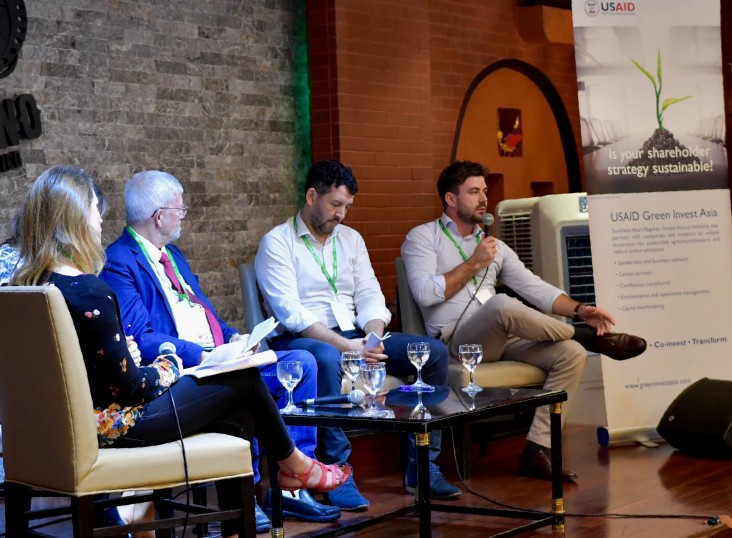Speeches Shim

BANGKOK – The United States Agency for International Development (USAID) Green Invest Asia project recently co-organized with Barry Callebaut, the world’s leading manufacturer of chocolate and cocoa, a half-day coconut networking event in Bangkok to advance pre-competitive collaboration on sustainable coconut supply chains and drafting of a “sustainable coconut charter” that emulates other commodities’ sustainability agreements.
Angela Hogg, USAID Regional Development Mission for Asia’s Environment Office Director, opened the November 7 event noting a widespread concern around the coconut industry – from cosmetics to confectionary companies – faces. “The challenge is how will the market meet double-digit rising demand for coconut water, sugar, and oil when there isn’t enough high-producing coconut trees to supply that demand.
Environmental gains of sustainable coconut cultivation include increasing productive use of coconut biomass; diversifying a traditionally mono-culture crop to increase farmers’ income and resilience to climate shocks, and; improving yield to avoid farmers expanding cultivation into forested areas.
Experts discussed mainstreaming sustainability via a proposed “Sustainable Coconut Charter,” progress they are making on sustainable coconut sourcing and innovative financing.
Given how companies are sourcing coconuts from the same provinces, and even the same suppliers, Yann Vuillerod, a responsible sourcing manager at Nestlé who covers Asia, said it makes sense for companies to split responsibility on improving sustainability. “It’s time to share budget [to improve sourcing locations]…Nestlé decided not to fast-track [our sustainability work] on our own, but to mainstream [our efforts] with core coconut sustainability priorities and collaborate to increase impact on the ground.” A nascent public-private partnership among Barry Callebaut, Proctor & Gamble, FrieslandCampina, and Nestlé is trying to attract more partners to improve coconut farmers’ livelihoods, incomes and yields to help ensure continued supply – collectively.
“The challenge of [origin sustainability] is too big for any of us,” said Matthias Radek, chief advisor for rural development and agriculture at GIZ, a German governmental aid agency. “If we are more, we can do more. We can achieve more,” he said, calling for more actors to join the company partnership to improve coconut sustainability at production level.
The Bangkok networking event built on the Sustainable Coconut and Coconut Oil Roundtable in March 2019, where industry leaders representing 40 percent of the coconut volume traded globally agreed on broad areas of improvement for the coconut industry: farmers’ livelihoods and income; supply of productive coconut trees; farmers’ productivity; traceability; deforestation prevention, and; farmers’ access to technology. Participants started charting how to work toward an industry-wide coconut charter that will identify common goals, benchmarks, and outcomes for coconut sustainability programs, offering buyers a tool to harmonize requirements to their supply chains.
“We are proud to support Barry Callebaut’s call to collective action, and will continue supporting efforts to improve the sustainability of coconut production and processing,” said Christy Owen, the director of USAID Green Invest Asia, which supports companies with low-emission sustainable sourcing. The project has signed an agreement with Barry Callebaut, which has pledged 100 percent “deforestation-free” chocolate and becoming carbon and forest-positive by 2025, to help the company lower carbon emissions in its coconut and cacao supply chains in the Philippines.
March 2020 in Kuala Lumpur is the next scheduled meeting to advance collaboration on the charter.

Comment
Make a general inquiry or suggest an improvement.